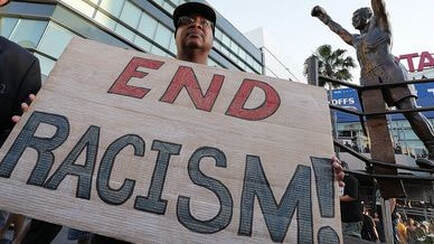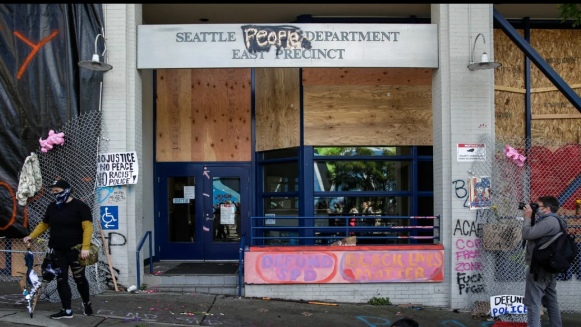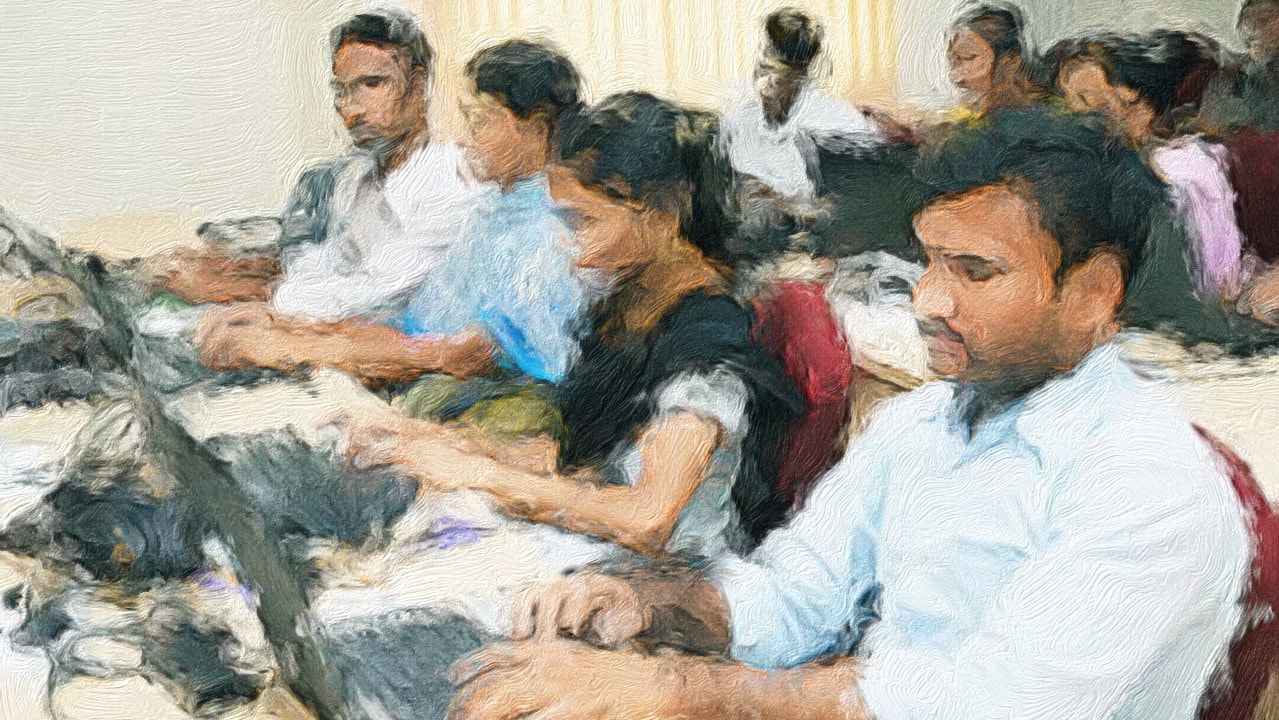|
Face it. The US Constitution is a dead letter. The American Constitutional scheme—federalism—exists only in as much as to allow outlaws within and without government to hurt the law-abiding. No other than Thomas Jefferson, an august constitutional authority if ever there was one, passed the 1807 Insurrection Act “Jefferson, to his credit, says I’m not going to act unless the Constitution says I can act,” says Fea. “The Federalists take a much broader view of the Constitution. If the Constitution doesn’t outright condemn it, then it’s OK.” Do it, Mr. President. Better late than never. Quell these bloody riots. Some skulls need cracking. It was early in June that POTUS promised to protect American life, liberty and property forsaken, by invoking the 1807 Insurrection Act. Oh yes, “There’s this long tradition of” deploying the military to protect only countries the US invades, so this would be a departure from the imperial tradition. Now, amid the razzmatazz of the Republican National Conference (RNC), being floated again is the idea of invoking the Insurrection Act to perform the negative duties of saving American lives and livelihoods. “Idea”? It’s more like a constitutional obligation hitherto ignored. The police, whose first duty is to uphold the negative rights of the citizens, appear to believe they serve not the citizens but local mob bosses like Seattle’s mayor, Jenny Durkan, and her crooked police chief, Carmen Best. The latter, who seems to worry more about the weave on her head and eyelashes than about the working people of the city, commanded her compliant and cowardly police officers to desert their posts and the people they swore to protect. This piece was previously published at IlanaMercer.com on August 27, 2020.
1 Comment
The "systemic racism" refrain is a meaningless abstraction. To concretize a variable, it must be cast in empirical, measurable terms, the opaque “racism” abstraction being one variable (to use statistical nomenclature). Until you have meticulously applied research methodology to statistically operationalize this inchoate thing called "racism"—systemic or other—it remains nothing but a thought “crime”: Impolite and impolitic thoughts, spoken, written or preached. Thought crimes are nobody's business in a free society. The law already mandates that people of all races be treated equally under its protection. The law, then, is not the problem, logic is. In particular, the logical error of reasoning backward. “Backward reasoning, expounded by mystery author Sir Arthur Conan Doyle through his famous fictional detective, Sherlock Holmes,” writes Dr. Thomas Young, “applies with reasonable certainty when only one plausible explanation for the … evidence exists.” Systemic racism is most certainly not “the only plausible explanation” for the lag in the fortunes of African-Americans, although, as it stands, systemic racism is inferred solely from one single fact: In aggregate, African-Americans trail behind whites in assorted academic and socio-economic indices and achievements. This logical error is the central tenet of preferential treatment—affirmative action, and assorted quotas and set-aside edicts and policies. According to diversity doxology, justice is achieved only when racial and ethnic groups are reflected in academia and in the professions in proportion to their presence in the larger population. On indices of economic well-being, the same egalitarian outcomes are sought. Equalizing individual and inter-group outcomes is an impossibility considering that it is axiomatically and self-evidently true to say that differences have existed since the dawn of time. Nevertheless, absent such wealth egalitarianism and proportional representation in the professions, the walking wounded who control America’s cultural discourse have concluded that racism, systemic or other, reigns. The systemic racism non sequitur is even harder to sustain when considering the Asian minority, a minority that has had its own historical hardships. In professions and academic pursuits where mathematical precocity is a factor, Asians are overrepresented, consistently outperforming whites. If proportional underrepresentation signals oppression, then overrepresentation, likewise, must reflect an unfair advantage. And if social justice requires that the State and corporate America act as social and economic levelers—then surely fairness demands that all minority groups that are overrepresented in assorted endeavors be similarly kneecapped in the name of equality? Should not such leveling policies be deployed to make the NBA or the 100-meter dash more “representative” of America? High among Corporate America’s priorities is acting as a race leveler—voluntarily sniffing out deviationists and generally proceeding against and “re-educating” pay-dependent prey. Corporate America’s human resource departments are in the habit of deluging employees with the racial agitprop of illiterate (if degreed) pamphleteers. The woman who wrote White Fragility comes to mind. In a workplace so shot through with hatred of whites, quite foreseeable is a form of intellectual reparations, where the designated white “oppressors” labor behind the scenes, while the officially “oppressed” manage them and take credit for their intellectual output. As recounted in Into the Cannibal’s Pot: Lessons for American From Post-Apartheid South Africa (2011, p. 103), the African National Congress has pioneered “the creation of a unique cognitive caste system.” Throughout the South African work force, "white subordinates with graduate and postgraduate degrees are doing the hard-core intellectual and technical work for their black bosses. The latter often have no more than a tenth-grade diploma but are paid a great deal more than their intellectual skivvies. A black matriculant (possessor of a high-school diploma) is perfectly poised to climb the South African corporate structure; yet, in order to have a ghost of a chance at remaining employed, a white had better possess the Masters or the Ph.D. degree. Given their pallor, promotion for whites is less and less likely." Unlike systemic racism, intellectual indentureship could quickly become a reality in America. This piece was previously published on August 7, 2020 at IlanaMercer.com.
On June 9, I tweeted out the following: Seattle’s East Precinct has fallen, as Police Chief Carmen Best orders Seattle Police to evacuate. The occupiers, aka the ‘peaceful protesters,’ declare victory. ‘They’ve given us the precinct,’ they boast. Not even in South Africa. A mere day on, and the City of Seattle was de facto occupied territory, fallen to the “peaceful protesters”—the same counterculture media darlings who’ve been sacking cities across America. The rabble—Black Lives Matter sympathizers, which, as police arrest records show, is almost entirely local—was further roused by Seattle City Council member Kshama Sawant, formerly of Mumbai. Most reprehensibly, pied piper Sawant led the “peace makers” to occupy City Hall in downtown Seattle, on Tuesday, June 10. The altercation between Council Member Sawant and Seattle Mayor Jenny Durkan gives new meaning to the “broad” sweep of ideas in this dysfunctional city. Sawant, a socialist, called on Mayor Durkan, a progressive, to resign over abuse of power (what power?) and systemic racism (a meaningless abstraction). This, as the city was being sacked. Surrender MonkeysAs of this writing, the Seattle Police have surrendered without defeat. Seven blocks of downtown Seattle, renamed the “Capitol Hill Autonomous Zone” (CHAZ), have been appropriated by the Peaceful Ones, with the imprimatur of the mayor and her police chief (Carmen Best aforementioned). Now loosed on the public, these buccaneering entrepreneurs are reported to have set up checkpoints to shake down local residents who imagine they may come and go. Not in this satrapy. On the positive side, Seattle now has that shithole-country vibrancy. President of the Seattle Police Officers Guild, SPOG, penned an open letter to lunatic Mayor Durkan, pondering how he would fulfill his sworn oath of office to protect lives and property without so much as tear gas. He got his answer. America did. Across the United States, the message to law-abiding Americans, from city, town, county council members and other legislators came loud and clear: You’re on your own. Neither police nor politicians are coming to protect what’s left of your businesses or your banal, bourgeoisie little life. Last I looked, there were 400,000 “guardian angels” in private security toiling to make up for the South African state’s failure to protect its people. Every year, millions in taxpayers’ money are forked out to private security firms to protect the new South Africa’s police stations. “South Africa’s protectors, in other words, can’t protect themselves.” Will Seattle’s neutered policemen be investigating this option? Is it time for them to cut the shafted taxpayers loose? Let us go private? When all is said and done, the George Floyd riots are a law and order event. Nothing else matters in the overarching context of a failed state, in which ordered liberty is dead, and the law-abiding are utterly forsaken, even vilified. Yes, victims are now villains and villains are martyrs. Unbeknownst to Nikolas Fernandez, a gainfully employed security guard, the Capitol Hill district of Seattle now belongs to the “peaceful protesters.” Fernandez dared to drive down it, only to be mobbed by the barbarians and forced to shoot an attacker possessing of animal-like agility. Legacy media quickly turned the narrative on its head. Fernandez, whose brother is a policeman, had invaded “peaceful protester” turf. His attacker took a bullet for peace. The attacker is now a hero. Kneeling NinniesNext came the national kneeling. Once again, Washington State led the way. On June 1, after hundreds of looters ransacked major shopping malls in Bellevue, including the spectacular Bellevue Square, that city’s police chief, Steve Mylett, knelt down like a girl, instead of standing tall like a man for law and order. “That was a scary scene in ‘Deliverance,’” someone quipped on Twitter. That was it. There was no stopping the kinky trend. Soon, Chief Brian Manley of Austin, Texas, broke down in tears for … the protesters, not for property owners robbed. Real manly. It’s almost as though WASPs get a homo-erotic sexual charge out of prostrating themselves in front of The Evil Other. The camera panned out across the country to reveal policemen and guardsmen caving. Against the backdrop of “Mad Max”-like dystopian destruction, men in uniform all collapsed to the pavements like yogis to the command of their black tormentors. One after another. Here is Santa Cruz Police Chief Andy Mills. Kneeling. The forces, police and paramilitary, all squatted like sissies. Isn’t there some code of conduct preventing uniforms from groveling? Police acquit themselves honorably by doing the job ethically. Activism is not in the job description. In Parker, Colorado, masses assumed the postures of ordination: prostration, lying prone, limbs splayed. Congressional Democrats, led by House Speaker Nancy Pelosi (D-Calif.), did the same. Is twerking next? Finally, we have a man in the house! “Georgia State Trooper O’Neal Saddler, who is black, refused to kneel during a Black Lives Matter protest in Hartwell. Quite rightly, he said he “only kneels for God.” And what a hot, decadent mess was this National Guard bump-and-grind in Atlanta: men, women, and everything in-between, mostly fat, hips swaying as they give themselves over to Dionysian urges. Cops can’t be responsible for every misstep a feeble-minded protester takes. An elderly geezer, Martin Gugino, in Buffalo, New York, came right up to a cop’s face when the latter was on the march. Cop pushed the git to get past him. The geezer was expecting a group hug and wasn’t prepared for a shove. He lost his balance and fell backward, bending like a twig. I saw no excess force, rather a “get out of my face” shove. But the cops were hung out to dry, anyway. Frey the FakerAs to Jacob Frey’s schtick: His was total grief appropriation. Frey is the mayor of Minneapolis, where George Floyd, in whose honor the global orgy of abreaction and destruction is being carried out, died by cop. Only people who knew an individual can legitimately have a Frey-like grand mal when mourning him. Otherwise, Frey’s performance at the casket was farcical, inauthentic; histrionic. The advice of Humphrey Bogart, playing Rick Blaine in “Casablanca” (channeled by Woody Allen in “Play It Again Sam”), should have been considered: “I never saw a dame yet that didn’t understand a good slap in the mouth …” The spectacle of mass contagion, where members of the public turn into professional mourners, flocking to funeral happenings for victims they never knew—this is warped. Grief is not a tribal affair. Communities don’t grieve; individuals who incur loss do. These are professional pornographers, not mourners. These phony displays among regular folks are at the root of our festering cultural commons. As kids, we knew our local policeman by name. He patrolled our neighborhoods regularly and joshed around with us. He lived among us. Community policing, however, is a thing of the past. Former Ferguson Police Officer Darren Wilson—notorious for shooting Michael Brown—gave a clue as to why. Wilson told the New Yorker that while he didn’t want to work in a white area, liked the black community and had fun there—he had experienced “culture shock.” Wilson described venturing into a “different culture”: a “pre-gang culture where you’re just running in the streets, not worried about working in the morning, just worried about your immediate gratification.” For his candor about an alien culture overtaking America, Wilson was called racist by CNN’s Boris Sanchez and Kate Bolduan. “To make us love our country, our country ought to be lovely,” said Edmund Burke, in his Reflections on the Revolution in France (1790). Darren Wilson’s words suggest a variation on Burke’s theme: To make cops love the communities they police, the communities they police ought to be lovely. Burke further reminded us in 1790 that, “To love the little platoon we belong to is the first principle (the germ as it were) of public affections.” But what happens when those little platoons are not so little and not so lovely? A country that is without a modicum of cohesion and is, by D.C. design, comprised of ever-accreting, competing factions—this kind of country cannot be lovely in the Burkean sense. In fairness to law-enforcement, communities in America must be damn difficult to police. This piece was originally published at IlanaMercer.com on June 11, 2020.
I was running up the mountain the other day. A couple was walking down it. I quickly crossed over, so as not to expirate all over them. To my surprise, they thanked me profusely. I’m healthy; they looked fit. Distancing may not have been necessary in this case. Yet, in this simple act of conscious distancing, in the epochal age of a terrifying, communicable disease—my neighbors and I had come closer than ever before. Fear gave way to fellow feeling. Having lived in both the developed and underdeveloped world, I have always associated social distancing with civility and civilization. Cultures that honor personal boundaries have always seemed better than cultures which don’t—more genteel, refined and respectful. Ditto people who keep a respectful distance: They have more merit than those who get in your face. Which is why the wish expressed by so many freedom-loving protesters to violate the personal space of others is vexing. Which is why comments such as the following are anathema: “Your ‘health’ does not supersede my right.” “Give me liberty or give me COVID-19.” “I am not required to descend into poverty for you.” In the absence of clinical therapies or a vaccine for coronavirus, the successful return to work rests, very plainly, on the willingness of the citizenry to cover up, keep clean and keep a distance. Why would anyone wish to infringe on another’s personal space, when the stakes are clearly so high? Insisting on unfettered freedom to come and go as one pleases, sans protection, comes at a grave cost to others—it could constitute aggression against innocent others. By the same token, the shuttering of private property by the State is an incontrovertible violation of private property rights. “Without property rights,” wrote Ayn Rand, “no other rights are possible. Since man has to sustain his life by his own effort, the man who has no right to the product of his effort has no means to sustain his life.” Even more fundamental, however, is that without dominion over one’s self—self-ownership—there can be no property rights. Rights to the avails of your labor originate in the right of self-ownership. If you don’t own yourself, you cannot own anything else, or produce anything, the avails of your labor and the products of your mind included. And if you are DEAD, DYING or INCAPACITATED—you own nothing (at least metaphysically; legally, you still own what you own). In libertarian theory, private property rights originate in that most important of all titles: The title in one’s own body. That body, that fount of life whence all rights originate, is the legitimate object of government protection in a pandemic. For, as I noted years ago, “Whether they are armed with bombs or bacteria, stopping weaponized individuals from harming others—intentionally or unintentionally—falls perfectly within the purview of the night-watchman state of classical-liberal theory.” The volcanic anger is understandable. The heartbreaking calls from restive protesters to reopen the American economy come from across the country: California, Colorado, Florida, Idaho, Maryland, Michigan, Minnesota, Missouri, New Hampshire, North Carolina, Oklahoma, Texas, Utah, Virginia and Wisconsin North Carolina, Ohio, Michigan, Washington state. Against this background, the natural rights of economically stricken individuals to reopen their businesses are righteous; they stem not from a state-created right or regulation. Rather, the right of ownership is the very extension of the right to life. In order to survive, man must—and it is in his nature to—transform the resources around him by mixing his labor with them and making them his own. Man’s labor and property are extensions of himself. So, my countrymen are correct to protest the shuttering of their privately owned property, also their sole means of sustaining their lives. All the same, there is another, equally compelling side to the ethics of this emergency situation. It is this: Each and every individual is or could be, inadvertently, harboring a weapon of mass destruction. Yes, a WMD—for how many men and women have died and will still die because of the inadvertent actions of the coronavirus-carrying Index Patients, during the “seeding events”? Each one of us could be firing off deadly virus into a defenseless population, bereft of immunity. Each one of us could become armed and dangerous, or be felled by someone who is. In this case, individuals who willfully violate social distancing strictures can be viewed as willful aggressors against innocent others. At once succinct and to-the-point, a reader whose online handle is “Mister Bigglesworth” summed it up: “I’m not a constitutional scholar, but you know what’s unconstitutional to me? Dying from some Oriental virus.” If I appear to be struggling with the ethics of this emergency—it is because I am. I must. This is vexing stuff. One thing I know, and it is that the sin of abstraction here is unforgivable—it is the propensity to settle for nothing less than an ideal version of liberty. Refusing to grapple with the political reality in which we ordinary mortals are mired is to dwell in the arid arena of pure thought. In conversation with a colleague about the ethics of this situation, she remarked: “We live under a given political system, and we can’t just wish it away. Hence, there will be actions taken within that system that are relatively good or relatively bad. The thing we must always guard against is this: Governments use crises to expand their power. Even when the crises are over, the expanded powers are often left in place, or certain key vestiges of these powers become a part of the institutions. “This we must guard against.” This piece was previously published at IlanaMercer.com on April 23, 2020.
Reality is bad enough; there is no need to explain the world using conjecture and fantasy. The facts suffice. Government is bad enough. There is no need to explain it using conjecture and fantasy. The facts about it suffice. In particular, imputing garden variety government evils to conspiracies is based on the following faulty premise: Government generally does what is good for us (NOT). So, whenever we think it is failing in a mission it fulfills so well (NOT), we should look beyond the facts for something more sinister (NOT). As if the State’s natural quest for expanded power were not enough to explain the events! Why, for example, would you need to search for the “real reason” behind an unjust, unscrupulous war, unless you honestly believed government would never prosecute such a war? History belies this delusion. Even when government prosecutes a just war, it finds ways to turn it into an unjust war by prolonging it. After all, a protracted crisis demands more taxpayer funds. Cui bono? For whose benefit? There’s no conspiracy here. The constituent elements of the bureaucratic behemoth that is government continuously work to increase their sphere of influence. Thus, grunts don’t benefit from war; the generals everybody reveres do. It is therefore but natural for the soldier’s superiors to pursue war for war’s sake. By virtue of its size, reach, and many usurpations, the U.S. government is a destructive and warring entity—no matter which of one the big-government parties is at the helm. Clearly, conspiracy thinking is not congruent with a view of government as fundamentally antagonistic to the welfare of the individual and civil society, a position held by a good number of libertarians and conservatives. Some conspiracy claims are more consequential than others. Those pertaining to coronavirus are an example. Let us, then, briefly discuss coronavirus and conspiracy. (Watch the YouTube corresponding to this section of the column here.) It is my sincere hope to help those whose affinity for conspiracy theories could put them at greater risk of contracting COVID-19. Indeed, governments—national, state, city—are engaged in a power grab that might be irreversible. Of that there is no doubt. But from the fact that the State is engaged in this power grab—it doesn’t follow that COVID-19, the disease caused by the SARS-CoV-2 virus, isn’t lethal. In other words, keep in mind that the two propositions are not mutually exclusive. To forget this, is to abandon reason and to risk coming short because of conspiracy thinking. To clarify: It’s piecemeal and incremental, but in this libertarian’s thinking, the State, by and large, presides over the disintegration of civil society. However, it does so reflexively, rather than as a matter of collusion and conspiracy. Again, the State consolidates power reflexively—a little bit here; a little bit there—and often in response to a real threat, rather than intentionally. Its agents are opportunistic predators, rather than grand conspirators. Suppose you disagree. Say you think the gargantuan American State is smart enough to coordinate a power grab, rather than do so automatically, and in response to a real threat. In this spirit, some honestly believe that the novel coronavirus is a harmless hoax invented in the belly of the beast to consolidate power. Suppose you act in accordance with these conspiracy convictions. You throw caution to the wind. And then you get infected. Who’s stupid now? In other words, the State’s agents and agencies do instinctively seize power—and coronavirus is real. Both propositions are true. And you are only as smart as your ability to integrate the two realities. This piece was previously published at IlanaMercer.com on April 16th, 2020.
Taking its cues from the American Left, the Israeli Left is all for national and individual self-immolation. But nobody who matters in that country has been listening to the Left babble on about “racism” and “Sinophobia.” Against the advice of its liberal think tanks—and to protect its nationals from the Wuhan virus pandemic—the Israelis had, early on, closed its doors to “more and more of eastern Asia, starting with China, continuing to Hong Kong, Macau, Singapore and Thailand, South Korea and Japan.” China is Israel’s second-largest trading partner. To follow were tough travel restrictions and a quarantine regimen on territories in Europe, in line with unfolding coronavirus contingencies. Israel has since extended the quarantine to all arrivals. Consequently, of the 9 million Israelis, 100 cases of COVID-19 have been recorded so far, but no deaths. What is proving more difficult for Israel is adding “New York and the states of Washington and California to its restricted list.” Israeli public health officials recommend it, but Prime Minister Bibi Netanyahu is being muscled by Vice President Mike Pence to keep his country open to those COVID-19 hot zones. Following transmission of the coronavirus from Wuhan to Washington State, I wondered, in a mild tweet, posted with links to the Israeli policy, why Americans didn’t deserve this kind of diligence from their government. Came the strident reply, also on Twitter: “Because, unlike Israel, the U.S. is not a postage-stamp-sized garrison state. The U.S. needs to tailor its response to the disease to its role as global economic power.” Stalin apologist Walter Duranty summed up this Jacobin perspective perfectly. “You can’t make an omelet without breaking eggs.” Breaking a few old eggs, in an old-age home, in King County, Washington State, is what it apparently takes to make that great global omelet. To the extent that it safeguards the well-being of its own people, the defensive measures taken by Israel comport with the role of government. “Whether they are armed with bombs or bacteria, stopping weaponized individuals from harming others—intentionally or unintentionally—falls perfectly within the purview of the night-watchman state of classical-liberal theory.” Look to other nationalistic countries for the connection between borders closed and the containment of the COVID-19 pandemic. As reported by CNBC, Russia had sealed its borders with China as hermetically as possible late in January. Matters are fluid, but at the time of this writing, Russia has only 34 cases of coronavirus and no deaths. The infected are said to be Russians returning from Italy. Likewise, Mongolia closed its borders with China in late January. Only a single case has been reported there. Singapore has reacted patriotically with all its scientific and cerebral might to what was termed there the “Wuhan flu.” It is now over the worst. The great Lee Kuan Yew would be proud. “The response in the U.S. has essentially been the opposite,” laments an envious geneticist writing at the Technology Review. For open-border offenders to talk-up open borders during a pandemic is scandalous—as scandalous as it would have been for Harvey Weinstein to be talking up rough sex during his sentencing for sexual assault. The open-border fetish is turning into a symbol of death, not freedom. For the correlation between borderless countries and infection rates seems unmistakable—certainly when one looks at Italy and the EU nexus of nuts to which it belongs. For Brussels, the undisturbed free flow of people across European borders is sacrosanct. The first U.S. “Proclamation on Suspension of Entry, as Immigrants and Nonimmigrants, of Persons who Pose a Risk of Transmitting 2019 Novel Coronavirus” was signed into law on January 30. It went into effect only on February 2. Reports from our nation’s airports, however, told of chaotic attempts to reroute passengers to 11 designated U.S. airports, for the purpose of screening that was as “enhanced” as temperature checks and a reliance on the “honest” say-so of the arrivals. At the time, no restrictions had been placed by the United States on arrivals from other COVID-19 hot zones. Passenger screening from source countries such as Italy was slack, to put it mildly. The government’s latest travel ban on Europe is welcome. Via the National Pulse: “[S]ubject to conditions on the ground . . . travel from Europe to the United States will be suspended for 30 days. These restrictions will not apply to the United Kingdom.” Alas, while it is true that the UK “is not part of the EU’s open-borders zone,” it has however—and as reports on terra firma suggest—been allowing any and all to enter from Europe practically unchecked. Put it this way: an officer “briefly pointing a thermometer gun at your forehead or watching as you go by for signs of a cough or difficulty breathing” does little to stop the virus from spreading. In fact, as a correspondent for Science magazine avers, “It’s exceedingly rare for screeners to detect infected passengers.” This article was previously published at IlanaMercer.com on March 13, 2020.
On November 29, 2019, a man now called the London Bridge terrorist slaughtered British student Jack Merritt. While the cutthroat has been named for a famous London landmark; his victim has been all but forgotten. The killer’s family was quick to condemn the London Bridge terrorist’s actions. The family of his victim—not so much. David Merritt, the late lad’s dad, got busy condemning those who wish to condemn that killer and his ilk to life in a cell. By December 2, Merritt the elder was already penning op-eds about clemency and leniency for criminals like the man who murdered his son. Such minute-made forgiveness would have been Jack’s wish, asserted Merritt senior rather presumptuously—for how can the living speak for the dead? David Merritt, then, proceeded to minimize what was murder with malice aforethought, by dismissing what his son’s killer did as a mere “tragic incident.” Just how obscene is the progressive mindset can be gleaned from what Mr. Merritt wrote: If Jack could comment on his death – and the tragic incident on Friday 29 November – he would be livid. We would see him ticking it over in his mind before a word was uttered between us. Jack would understand the political timing with visceral clarity. He would be seething at his death, and his life, being used to perpetuate an agenda of hate that he gave his everything fighting against. … What Jack would want from this is for all of us to walk through the door he has booted down, in his black Doc Martens. That door opens up a world where we do not lock up and throw away the key. Where we do not give indeterminate sentences … Where we do not slash prison budgets, and where we focus on rehabilitation not revenge.” [Emphasis added.] Anti-punishment ideologues like Merritt, incorrectly and condescendingly conflate punishment with “hate” and vengeance, and justice with restitution and “rehabilitation.” They typically treat us to facile flimflam such as that the desire for vengeance cannot become the foundation of jurisprudence. By this verbal manipulation, these ideologues disingenuously advance a definition of justice that precludes incarceration and instead equates that object with restitution and rehabilitation alone. Compared to David Merritt’s woke sentiments, the family of the London-Bridge Killer was mundane in its proper and civilized expiation: “We are saddened and shocked by what Usman has done,” said the family. “We totally condemn his actions and we wish to express our condolences to the families of the victims that have died and wish a speedy recovery to all of the injured.” But there was apparently no need to apologize, Mr. and Mrs. Khan. Speaking for his dead son, David Merritt appears to have already made peace with Jack’s ripper. In their extreme versions, anti-punishment ideologues like David Merritt often plump for complete penal abolition. Driven by parental and pedagogic progressivism, Jack, of blessed memory, had “devoted his energy to the purpose of a “pioneering program” called “Learning Together,” which aims “to bring students from university and prisons together to share their unique perspectives on justice.” The imperative to offer up young lives to this or the other manifestation of Moloch is a progressive impulse—an obscene one, at that. If young Merritt’s murder proves anything it is that Cambridge University’s social-justice outreach, “Learning Together,” is a costly indulgence, as Jack was murdered on the job. More generally, the movement for restorative justice holds that problems plaguing the criminal justice system are reason enough to abolish it. Oddly, the movement’s position is starkly utilitarian, and bereft of principle: Incarceration, assert proponents of “no-fault” forgiveness, doesn’t reduce rates of re-offense and doesn’t bring back the dead. Ergo, abolish it we must and heal the criminal in the community. After all, responsibility for individual evil actions lies really with “society.” Justice, say the activists, is therefore best sought by a redistribution of wealth and resources. But, contrary to such pinko propaganda, our prisons aren’t loaded with choir boys. Usman Khan was no victim of the system (although he claimed to have been fat-shamed or bullied for nurturing a prison paunch. Boo hoo). Rather, it was Jack Merritt who was the victim of a system that had automatically released a man with murder on his mind on a kind of meritless-reprieve scheme, and despite the man’s vow to do violence. When just a teen, the killer plotted to attack the London Stock Exchange. He, then, fooled those around him by feigning remorse and a desire to reintegrate into British society. From the dizzying heights of Platonic theorizing, libertarian anti-incarceration theorists typically point out quite correctly that crimes are committed against individuals and not against the amorphous entity called “society.” Solutions, they say, should, therefore, focus on making criminals pay restitution to their victims. Here on terra firma, the prosaic fact is, however, that when more dangerous offenders are incarcerated, fewer innocent individuals suffer. When fewer violent criminals are apprehended, more innocent individuals are harmed. If innocent individuals are incarcerated—a horrible thing against which jurist William Blackstone railed, in 1769, saying “the law holds that it is better that 10 guilty persons escape, than that 1 innocent person be convicted”—they (and not “society”) are harmed. Although I would not argue against compelling criminals to do penance shaped by their victims, some libertarian anarchists want to see punishment replaced by a system of financial restitution. But in cases (and there are many) where criminals can’t remotely repay victims for the harm done (especially in violent crimes), this means the consequences to the criminal won’t be remotely proportionate. In effect, by rejecting proportionate punishment for what is usually disproportionately paltry “restitution,” libertarian abolitionists are endorsing systematic injustice. At least among libertarians, the cause du jour should not be to reduce the involvement of the state at any costs, if it means freeing guilty offenders. Rather, it should be to reduce prison population by freeing innocent people whose activities, lawful by natural-law standards, the state has criminalized. Whether punishment makes people feel good, whether it reforms the criminal or safeguards the public is immaterial, although I would argue that a society with a moral code is safer in the long run than one without it. Punishment is a public declaration of moral standards. It is an extension of natural law. Descend into the anti-incarceration activist’s amoral abyss, and you abolish the very fabric of our ethical tradition. Fortunately, David Merritt’s meritless advocacy for a man who swore to murder again is mute. The killer was dispatched, his descent into hell hastened by the city of London’s police force. This article was previously published at IlanaMercer.com on January 16, 2020.
America is “a society that is and always has been multiethnic and polyglot,” burbled David Frum, in a 2016 exposition. It’s a refrain repeated by centrists like Frum and French (also David), by all lefties and by well-trained faux rightists. Such dissembling about America having always been multicultural are no more than post hoc justifications for turning the country into a veritable Tower of Babel. Early America’s colonies were founded by Englishmen in periwigs, speaking different English dialects. They were joined by Irish, Scottish, French, Dutch, German and Swedish Christians, who quickly adopted English as lingua franca. Not even the woke Wikipedia denies that, “Nearly all colonies and, later, states in the United States, were settled by migration from” one colony to another, with “foreign immigration” generally playing “a minor role after the first initial settlements.” In other words, population growth was organic, a result of the settlers themselves multiplying and being fruitful, not of a flood of immigrants. This so-called “multiethnic” dispensation saw early Americans publicly debate and come to a broad agreement on some highly complex, abstract matters of political philosophy, an impossibility today. The colonial community had to be pretty tight to arrive at the Articles of Confederation, followed by the Constitution. Try as he might, not even the sainted Barack Obama got away with claiming, as he did, that, “Islam had been woven into the fabric of our country since its founding.” Beyond their heavy involvement in the slave trade and in the Barbary wars—and contrary to Obama’s modern myth-making—Muslims were most certainly not enmeshed in America from its inception. Moreover, and almost to a man, the learned Founding Father, as chronicled by Laura Rubenfeld of PJ Media, held a dismal view of Islam and its vampiric prophet. It gives me great pleasure to break it to my anti-Semitic readers and to Ilhan Omar, the representative from Mogadishu in Minnesota: Jews were around. Early American Jews were of, mostly, Sephardi origins, having hailed from Spain and Portugal. That Jewry has always been more refined and reactionary than their radical, East-European brethren, who arrived much later. And so we find Jews fighting or financing the War of Independence. Francis Salvador and Haym Solomon come to mind. “The highest ranking Jewish officer of the Colonial forces was Colonel Mordecai Sheftall.” Why, Jews even produced proud Confederate soldiers, the likes of Col. Abraham Charles Myers. It was to the peaceful Jews of America that George Washington saw fit to promise peace and goodwill in a 1790 address to a synagogue congregation in Newport, Rhode Island. Descendants of the original inhabitants of the United States of America are certainly not up to dealing with the political aggression brought to the country’s politics by recent immigrants. Come to speak of it, neither are the First Nations, the American Indians, who’re also politically more passive, when compared to the barbarians who’ve joined the Empire, since 1965. To tether the character of Rep. Ilhan Omar to America’s immigration preferences is perfectly proper. Likewise Rashida Tlaib. The representative from Michigan is a second-generation Palestinian-American, and is every bit as tribal, politically aggressive and reliably leftist as Omar. By virtue of its main source countries, America’s mass immigration policy privileges individuals like Omar: angry, anti-white, and highly receptive to theories that blacken the West and porcelainize the undeveloped world (a pedagogic poison that is, by the way, hothoused in the U.S.—K to 12 and beyond). Muslim power in the U.S., we are assured, is negligible. Demographers peg the number of Muslims in America at 3.5 million, a mere 1 percent of the population. Nobody buys that—all the more so, given that “the Census Bureau has not asked questions about religion since the 1950s. “Some say the number is closer to 5 million and rising,” surmises the Economist. The more politically aggressive the new arrivals, the more demographers stick by their “puny numbers” consolation. Kamala Harris’ mother migrated to California from Chennai, in southern India. But the senator “rarely mentions the Indian side of her family while campaigning.” (I wonder why?) How long before Harris tells her unschooled voters that Indian-Americans were “woven into the fabric of our country since its founding”? The truth is that Indian-Americans have “arrived in America over the past two decades.” They’re a new addition to the country’s state-planned, multicultural mosaic. But, like Muslims, they are highly aggressive politically and reliably leftist. “… Capitol Hill, for example, is crammed with staff and interns of Indian-American heritage. They also appear to be ‘over-represented’ in academia, the media and other influential posts,” notes the Economist, a left-liberal news magazine. Again, we are assured that “only 1 million voters of Indian descent are politically active.” Accordingly, the Economist even attempts to finesse the vile practice Indian arrivals have of cultivating their own, Indian-only “informal networks.” As those in the corporate world know all-too-well, Indian-Americans wrestle jobs for one another and for their kin. Once ensconced in a position of power, individuals of South Asian descent tend to work assiduously to fire pale faces and hire others of their own persuasion. Anglo-Americans, on the other hand, hire by talent, not by tribe. Their fate in multicultural America is to be dispossessed by the politically savvy, ruthlessly racist Other. For that is the reality of multiculturalism in the West. It means conferring political privileges on many an individual whose illiberal practices and proclivities run counter to, even undermine, the American political tradition. This article previously appeared on IlanaMercer.com on Nov. 7, 2019.
From the riffs of outrage coming from the Democrats and their demos over “our democracy” betrayed, infiltrated even destroyed—you’d never know that a rich vein of thinking in opposition to democracy runs through Western intellectual thought, and that those familiar with it would be tempted to say “good riddance.” Voicing opposition to democracy is just not done in politically polite circles, conservative and liberal alike. For this reason, the Mises Institute’s Circle in Seattle, an annual gathering, represented a break from the pack. The Mises Institute is the foremost think tank working to advance free-market economics from the perspective of the Austrian School of Economics. It is devoted to peace, prosperity, and private property, implicit in which is the demotion of raw democracy, the state, and its welfare-warfare machine. This year, amid presentations that explained “Why American Democracy Fails,” it fell to me to speak to “How Democracy Made Us Dumb.” (Oh yes! Reality on the ground was not candy-coated.) Some of the wide-ranging observations I made about the dumbing down inherent in democracy were drawn from the Founding Fathers and the ancients. A tenet of the American democracy is to deify youth and diminish adults. To counter that, I’ll start with the ancients. The Athenian philosophers disdained democracy. Deeply so. They held that democracy “distrusts ability and has a reverence for numbers over knowledge.” (Will Durant, “The Story of Philosophy,” New York, New York, 1961, p. 10.) Certainly, among the ancients who mattered, there was a keen contempt for “a mob-led, passion-ridden democracy.” The complaint among Athenians who occupied themselves with thinking and debating was that “there would be chaos where there is no thought,” and that “it was a base superstition that numbers give wisdom. On the contrary, it is universally seen that men in crowds are more foolish, violent and cruel than men separate and alone.” (p. 11) Underground already then, because so subversive—anti-democratic thinking was the aristocratic gospel in Athens. Socrates (born in 470 B.C.) was the intellectual leader against democracy and for the even-then hated aristocratic philosophy. Socrates’ acolytes, young and brilliant, questioned the “specious replacement of the old virtues by unsocial intelligence.” The proof of the foolish, violent and cruel nature of the crowds is that the crowds, not the judges, insisted on making Socrates the first martyr of philosophy. He drank the poison at the behest of the people. No wonder Plato, Socrates’ most gifted student, harbored such scorn for democracy and hatred for the mob—so extreme that it led this controversial genius to resolve that democracy must be destroyed, to be replaced by his planned society; “the rule of the wisest and the best, who would have to be discovered and enabled.” Plato’s “Republic,” seconds the Economist, “is haunted by the fear that democracies eventually degenerate into tyrannies” (June 22, 2019). To libertarians, Plato of the planned society was wrong. However, the fear reverberating throughout his “Republic” is righteous. A democratic utopia of freedom cannot come about because of the nature of man, thought Plato. Men “soon tire of what they have, pine for what they have not, and seldom desire anything unless it belongs to others. The result is the encroachment of one group upon the territory of another.” (“The Story of Philosophy,” p. 19.) Plato agreed, that “the diversity of democracy’s characters … make it look very attractive.” However, “these citizens are so consumed by pleasure-seeking that they beggar the economy”; so hostile to authority that they ignore the advice of sages, and so solipsistic and libertine that they lose any common purpose. Most agreeable to libertarian thinking was Aristotle, who ventured that democracy is based on a false assumption of equality. It arises out of the notion that “those who are equal in one respect (under the law) are equal in all respects. Because men are equally free, they claim to be absolutely equal.” (P. 70) Tocqueville, too, was not sold on the new American democracy. He conducted “his extensive investigation into American life, and was prepared to pronounce with authority [about what he termed the new democracy].” (Russell Kirk, “The Conservative Mind,” Washington D.C., 1985, 205-224) The American elite, Tocqueville observed, does not form an aristocracy that cherishes individuality, but a bureaucratic elite which exacts rigid conformity, a monotonous equality, shared by the managers of society.” (p. 218) Remarking on “the standardization of character in America,” Tocqueville described it as “a sort of family likeness” that makes for monotony. (p. 210) What menaces democratic society … a tyranny of mediocrity, a standardization of mind and spirit and condition … The mass of people will not rest until the state is reorganized to furnish them with material gratification.” “Pure democracy makes libertarian democracy impossible,” posited Tocqueville. (p. 213) “In America, the majority raises formidable barriers around the liberty of opinion; within certain barriers, an author may write what he pleases, but woe to him if he goes beyond them … his political career is then over, since he has offended the only authority able to defend it. … Before making public his opinions, he thought he had sympathizers, now it seems to him he has none any more, since he revealed himself to everyone; then those who blame him criticize loudly, and those who think as he does keep quiet and move away without courage. He yields at length, overcome by the daily effort, which he has to make, and subsides into silence, as if he felt remorse for having spoken the truth.” (p. 218) Consider that Tocqueville was writing at a time so much smarter than our own. Tocqueville in the 19th century, and Solzhenitsyn in the 20th, noted that conformity of thought is powerfully prevalent among Americans. This column, now in its 20th year, can attest that writing in the Age of the Idiot is about striking the right balance of banality and mediocrity, both in style and thought, which invariably entails echoing one of two party lines and positions, poorly. Let us not forget Friendrich Nietzsche (admired by H. L. Mencken, whose genius would have remained unrecognized had he been plying his craft in 2019). Born 39 years after Tocqueville, Nietzsche saw nothing good in democracy. “It means the worship of mediocrity, and the hatred of excellence. … What is hated by the people, as a wolf by the dogs, is the free spirit, the enemy of all fetters, the not-adorer, the man who is not a regular party-member. … How can a nation become great when its greatest men lie unused, discouraged, perhaps unknown … Such a society loses character; imitation is horizontal instead of vertical—not the superior man but the majority man becomes the ideal and the model; everybody comes to resemble everybody else; even the sexes approximate—the men become women and the women become men.” (“The Story of Philosophy,” p. 324.) For their part, America’s founders had attempted to forestall raw democracy by devising a republic. In his magisterial “Introduction to the Constitutional Principles of American Government,” constitutional scholar James McClellan noted that universal suffrage and mass democracy were alien to the Founders: “They believed that a democracy would tend toward mediocrity and tyranny of the majority.” Writing about the first state constitutions (penned between 1776-1783), McClellan attests that, “A complete democracy on a wide scale was widely regarded throughout the colonies as a threat to law and order.” Why, Pennsylvania became the laughingstock in the colonies when it “abolished all property qualifications for voting and holding office. This confirmed the suspicions of many colonial leaders that an unrestrained democracy could drive good men out of public office and turn the affairs of state over to pettifoggers, bunglers, and demagogues.” A conga-line of those you witnessed at the CNN/New York Times Democratic debate, the other day. “The Founders wanted representation of brains, not bodies,” observed McClellan, noting that, at least “for a number of years, the best minds in the country dominated American politics.” No more. This article was previously published at IlanaMercer.com on Oct. 17, 2019.
Adroitly, President Trump has optimized outcomes for the American Worker. His is a labor market like no other. Long overdue in the U.S., a labor market is one in which firms compete for workers, rather than workers competing for jobs. “For the first time since data began to be collected in 2000, there are more job openings than there are unemployed workers.” By the Economist’s telling (July 12, 2018), “Fully 5.8 million more Americans are in work than in December of 2015.” Best of all, workers are happier than they’ve been for a long time. Not so business. For American business, it’s never enough. Big or small, business is focused on elephantine-like expansion. Big and small, business is nattering about labor shortages: “Ninety percent of small businesses which are hiring or trying to hire workers report that there are few or no qualified applicants, according to the National Federation of Independent Business.” With blaring headlines, the megaphones in the financial press are amplifying a message of dissatisfaction: “The shortage is reaching a ‘critical point’ … A lack of applicants for blue-collar jobs such as trucking and construction has received particular scrutiny, as have states like Iowa where the unemployment rate is especially low (it is just 2.7 percent in the Hawkeye state).” August 31 saw President Trump sign an executive order meant to further boost small businesses. These will be permitted “to band together to offer 401(k)s.” Again, nice, but not enough. It never is. A businessman present piped up about “a very tight labor market … causing us a little bit of a problem.” Contrast this gimme-more-forever-more attitude, with the patriotic perspective of your average Trump supporter: “I’m willing to take my lumps for the good of the country,” a farmer told broadcaster Laura Ingraham. “The Scottish in me says to the death.” Look, a labor market allows wages to rise and productivity to grow, for unprofitable firms will soon fold when they find they can’t pay enough to attract workers. Scarce resources—labor and capital—are then “put to better use.” More crucially, wage gains accrue “to the poorest workers.” As the neoliberal, Trump-hating Economist notes, “Full-time employees at the 10th percentile of the income distribution are earning almost 4 percent more than a year ago.” Beware; the good times may be short-lived. Trump’s response was Pavlovian. He promised the bitching businessman to “start looking at, very seriously, merit-based immigration. We have to do it, because we need people.” Read: We don’t have enough fabulous people among a labor force 160-million strong. This is the conditioned response corporate America has come to expect from Power. Business wants the world as its labor market, because? Fill in the blanks, dear reader. For its part, government cares a great deal about outsized sectional interests and GDP (gross domestic product) numbers, as churned out by number-crunchers. But, surely prosperity is about per capita growth as well, and—dare I say? —the wealth and health of local communities? We know that multinationals—stateless corporations; “global beasts with vast balance-sheets”—are preoccupied with increasing value for shareholders. However, that and training American talent are not necessarily mutually exclusive. What’s so wrong with making fellow Americans part of the success story? This may slow economic growth, but may increase its sustainability; make it the kind of growth around which authentic, organic communities can coalesce. And what’s wrong with doing well enough with the labor available in the country? Or, with a view to training American talent? Or, with a mind to paying more for local labor? As it stands, business is permitted to petition The State to import the world at a price heavily subsidized by disenfranchised American taxpayers. By extension, the attitude of business toward economic growth is rooted not in healthy, community-based practices (stateside and abroad), but in some aberrant economic gigantism; in an economic elephantiasis undergirded by greed. Fair enough: Small business wants to be big when it grows up. But let us not confuse the metastatic multinational, motivated by mammon alone, with a business whose growth is sustained by communities, as opposed to colonies of imported labor. This piece was originally published at IlanaMercer.com on September 20, 2018.
|
AuthorIlana Mercer has been writing a weekly, paleolibertarian column since 1999. She is the author of “Into the Cannibal’s Pot: Lessons for America From Post-Apartheid South Africa”(2011) & “The Trump Revolution: The Donald’s Creative Destruction Deconstructed” (June, 2016). She’s on Twitter, Facebook, Gab & YouTube Archives
March 2024
|










